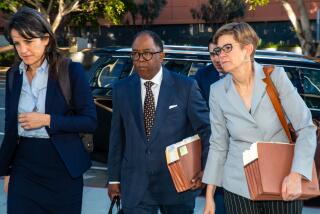Reiner Decided Earlier Against a Third Trial : Prosecution: The district attorney says he told aides this week that he would not seek to continue the case if the jury was unable to reach a verdict.
- Share via
After seven years and two contentious trials, Dist. Atty. Ira Reiner did not bother waiting for the McMartin jury to return to decide that the longest and costliest case in American history was over.
If the jury could not reach a verdict, he told high-level prosecutors earlier this week, then he would: There would be no third trial.
Reiner made his decision--which he emphasized would have remained firm even if the jury voted largely in favor of guilt on the eight molestation counts--after a series of private discussions with top aides and the two McMartin trial prosecutors. One of the prosecutors also discussed the issue with the parents of the three remaining child witnesses.
Reiner, whose recent bid for the Democratic nomination for state attorney general was derailed in large part by the McMartin case, told reporters Friday afternoon that there had been no dissent on the matter. Then again, Reiner added, dissent would not have mattered.
“I don’t mean to be flippant about it,” he said. “But after it was discussed, I said this is what I think we should do, and that made it unanimous.”
Reiner said the basic reason for bringing the McMartin case to a conclusion once and for all was simple: Enough was enough.
“There have been two trials and the case has been tried as thoroughly as is humanly possible,” Reiner said. “Nothing would be served by putting the children, their parents, indeed the public, and the criminal justice system, through this a third time.”
At an afternoon press conference, Reiner also reflected on the quality of the evidence and the impact of the case on his career.
The first trial, which lasted almost three years, spotlighted problems with the taped interviews of the child witnesses by outside therapists, Reiner said. Jurors had ample reason for concern, he said, that the children were somehow led into believing that they had been molested.
“Although it needed to be tried, and it certainly would have been far preferable that this case be tried to a conclusion, the fact is that there are certain fundamental problems with the evidence that go back some six or seven years.”
Despite such problems, Reiner said, a decision was made to retry Buckey once in order to determine whether guilty verdicts could be won in a shorter trial handled “with dispatch and with precision.”
“As a matter of simple justice, it was important to at least try to see if there could be a resolution,” Reiner said. “I think now it is clear that there cannot be and there should certainly not be a third trial.” Next week, two deputy district attorneys will ask Superior Court Judge Stanley Weisberg to officially drop the unresolved charges.
During Reiner’s unsuccessful bid for state attorney general, detractors charged that Reiner ordered the case retried to avoid conceding defeat. But if so, it didn’t work. Campaign polls repeatedly showed that publicity surrounding McMartin was a significant negative factor in Reiner’s campaign.
On Friday, Reiner, who has been reticent about discussing his loss publicly, acknowledged that the case had a major bearing on his race.
“When you are the district attorney, you have decisions that are sometimes no-win decisions,” he said. “And clearly, that’s what this is. Obviously, it had a major political impact.”
Asked if, upon reflection, he would have made the same decision to try the case a second time, Reiner replied:
“I may have paid a very serious personal price for it. If I had to do it over again, I’ll tell you what the answer is. I’d hope that I would make the same decision. Obviously, when you take a beating from it, you’re never sure if you did it again, if you would be able to stand up there and do it.
“I think I would. I certainly hope I would.”
More to Read
Get the L.A. Times Politics newsletter
Deeply reported insights into legislation, politics and policy from Sacramento, Washington and beyond. In your inbox twice per week.
You may occasionally receive promotional content from the Los Angeles Times.










